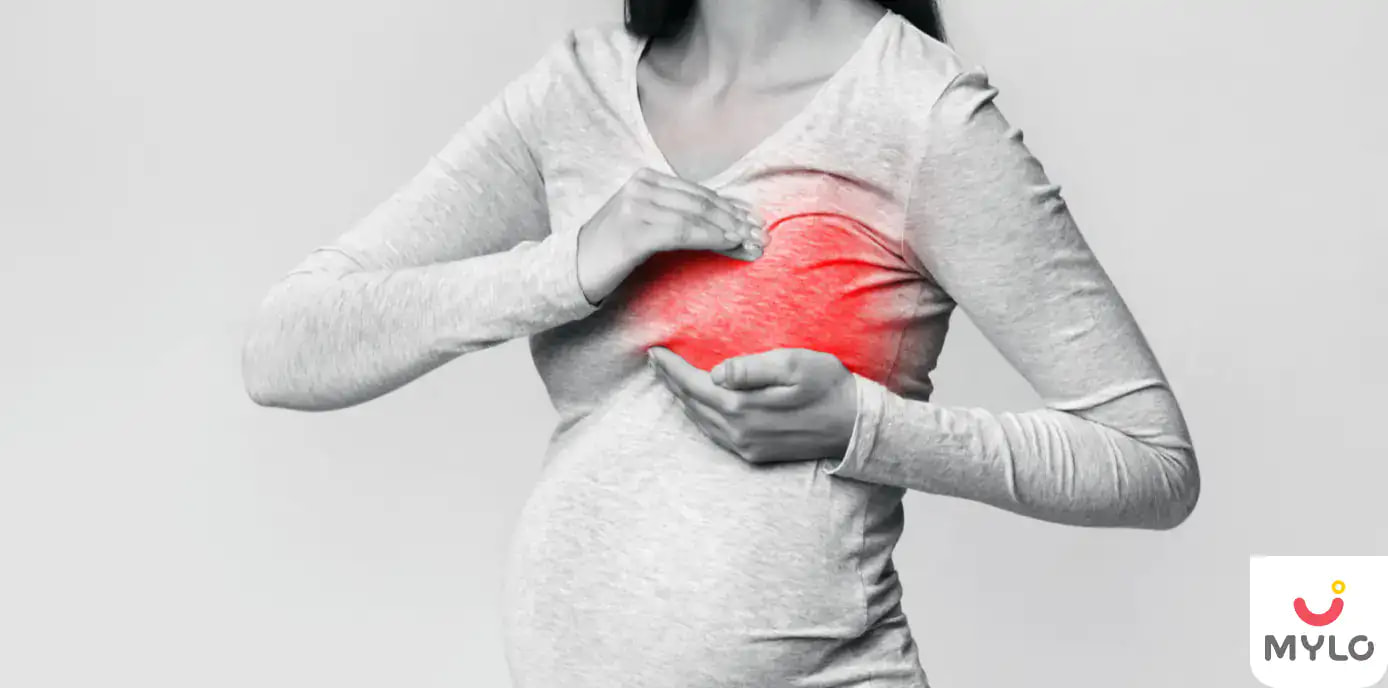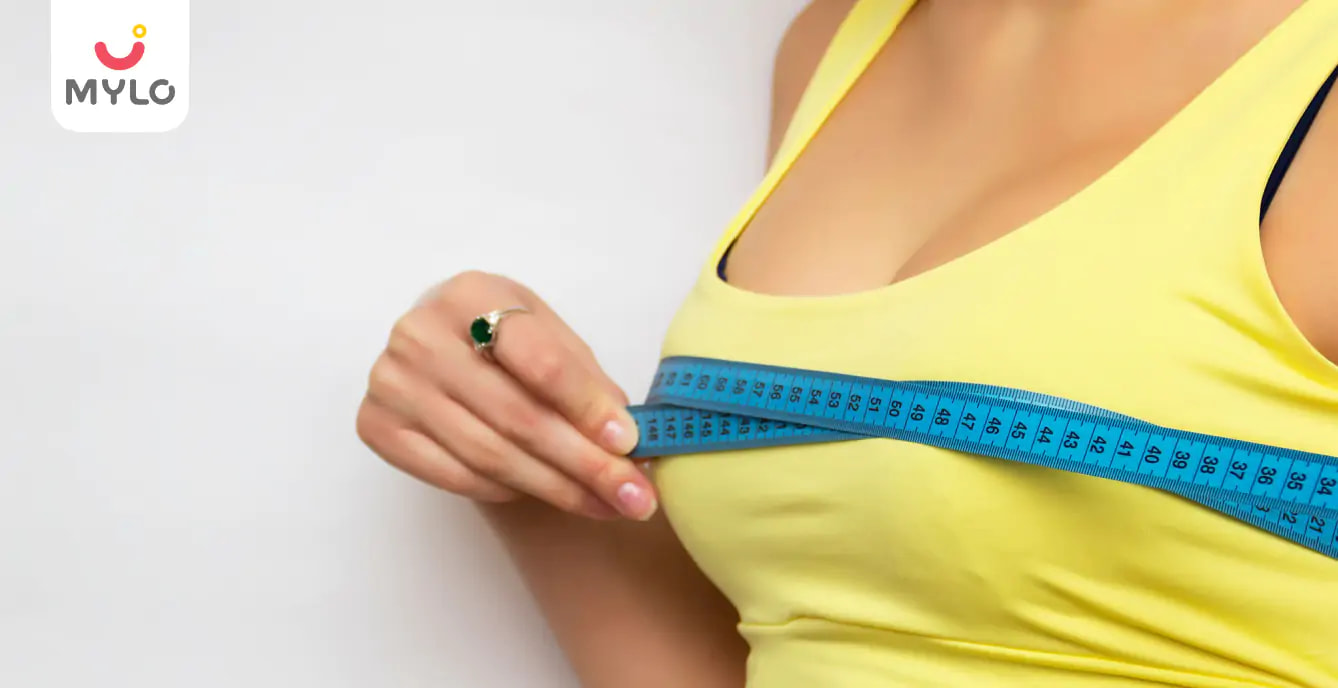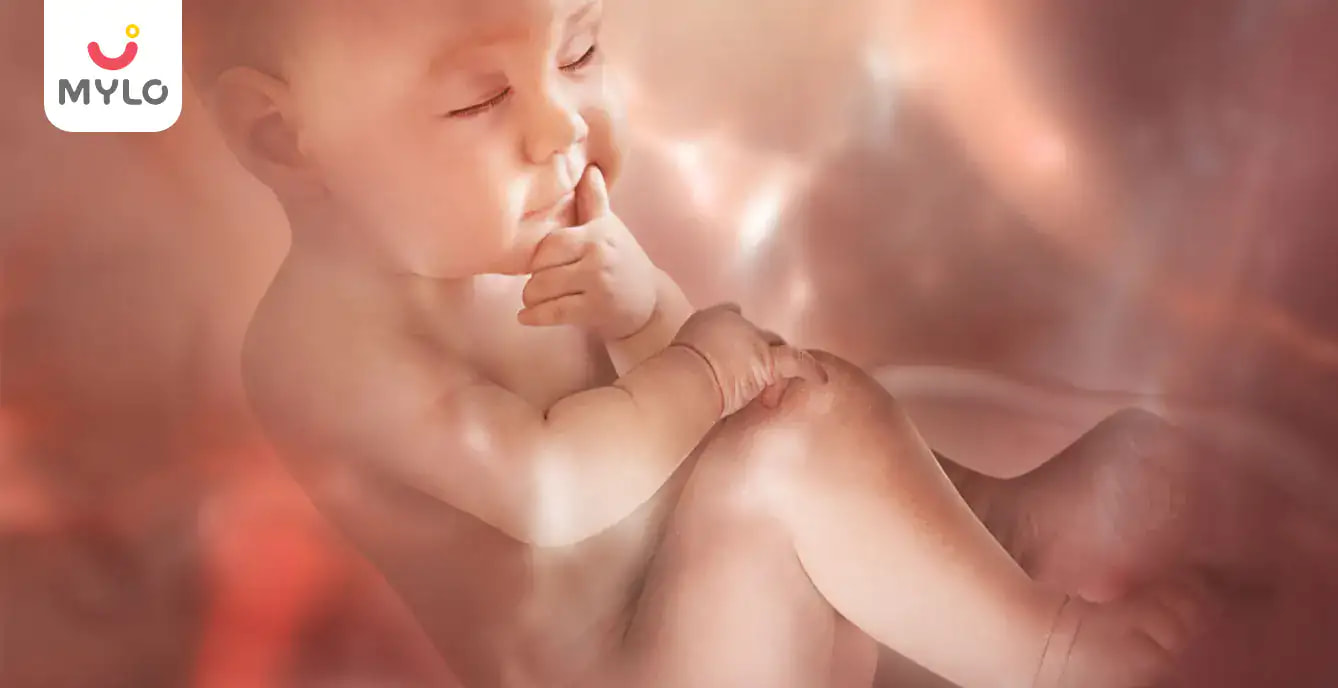Get MYLO APP
Install Mylo app Now and unlock new features
💰 Extra 20% OFF on 1st purchase
🥗 Get Diet Chart for your little one
📈 Track your baby’s growth
👩⚕️ Get daily tips

OR


Article Continues below advertisement
Home

Breast Changes

Breast and Nipple Changes During Early Pregnancy
In this Article
- Breast changes in early pregnancy
- 1. Breast Tenderness
- 2. Breast Size Increase
- 3. Hormonal Changes
- 4. Changes Around Areola
- 5. Nipple Discharge
- 6. Montgomery's glands
- Some Helpful Tips to Deal With Breast Changes in Early Pregnancy
- Summary
- References

Breast Changes
 25800
25800Breast and Nipple Changes During Early Pregnancy
Updated on 3 November 2023
During the early stages of pregnancy, a woman's body undergoes incredible transformations to support the growth and nourishment of a developing baby. Among them, nipple changes in early pregnancy are significant and therefore, it becomes important to remain aware about these changes.
Embarking on the journey of pregnancy is a remarkable experience filled with joy, anticipation, and a myriad of changes happening within your body. One area where these changes are particularly intriguing is in the breasts and nipples. As soon as pregnancy begins, a series of fascinating transformations take place, all in preparation for the incredible task of nourishing your growing baby.
Join us as we delve into the captivating world of breast and nipple changes during early pregnancy. We'll explore the hormonal influences, the physiological adjustments, and the amazing functions that these changes serve. Get ready to uncover the secrets behind the tender love and care your body provides as it prepares to nurture your little one. So, sit back, relax, and let's embark on this journey of discovery together, exploring the fact that how do nipples look like in early pregnancy.
Article continues below advertisment
Breast changes in early pregnancy
From tender and swollen breasts to darkening areolas and the emergence of Montgomery's tubercles, your breasts and nipples become key players in the miraculous process of creating new life. Here are some changes you can expect during early pregnancy:
1. Breast Tenderness
Sometimes, your breasts may begin to swell and feel tender during the first trimester of your pregnancy (weeks 1 through 12). They might feel tingly. Your nipples can protrude more than usual.
You may also like: Breast Changes & Pain During Early Pregnancy: Causes and Remedies
2. Breast Size Increase
During the next three months of pregnancy, your breasts will continue to increase in size and weight. You should consider wearing a bra that offers higher support. You will most likely experience less tenderness and, further, less tingling as the early stages of pregnancy progress.
3. Hormonal Changes
First and foremost, hormones take center stage in orchestrating these remarkable transformations. As soon as pregnancy begins, hormonal changes, particularly an increase in estrogen and progesterone, stimulate the mammary glands. This stimulation prompts the growth and development of the milk ducts and lobes in preparation for breastfeeding.
Article continues below advertisment
4. Changes Around Areola
When your breasts grow, the veins hidden under the skin become more apparent. Nipples and the peripheral area around them, known as the areola, become darker and more extensive and this marks the nipple changes in early pregnancy. On the areola, you might notice some tiny bumps. After you give birth to your baby, you won't have to worry about these bumps anymore. Some women experience breast stretch marks during pregnancy.
Also read: Experiencing Body Changes During Pregnancy: Know What to Expect?
5. Nipple Discharge
You may see a yellowish discharge, known as colostrum, coming from your nipples as early as the 16th to the 19th week of your pregnancy. Simply put, this indicates that your breasts are preparing themselves for breastfeeding. Colostrum is often referred to as "pre-milk" because of its role in warding off illness in infants during the critical first few days of life.
6. Montgomery's glands
Another remarkable change during early pregnancy is the development of Montgomery's glands. These tiny glands in the areolas produce a substance that acts as a natural lubricant and antibacterial agent. This secretion is thought to help keep the nipples and surrounding area clean and protected.
Article continues below advertisment
Some Helpful Tips to Deal With Breast Changes in Early Pregnancy
With so many changes to your breasts, you must look for measures to make yourself feel better and avoid infection or health complications. Here are a few suggestions that might be useful:
-
If you feel pain or tenderness in your breasts, wear the kind of bra that offers good support in the back. Padded shoulder straps can be of assistance. Bras made from cotton are more comfortable for you. You can also invest in some Maternity wear bras for added comfort and support during pregnancy.
-
At night, try a sleep bra. Even though they are softer and lighter, these bras will still support you while you sleep.
-
Do not apply soap to the area that surrounds your nipples. It has the potential to make the skin dry. Just using warm water to clean them should be sufficient.
-
If you notice itching in areas of your skin where it has stretched, such as on your stomach, breasts, or anywhere else, steer clear of showers and baths that are too hot.
Article continues below advertisment
-
After you get out of the shower or bath, pat off any excess water and apply moisturizer to your skin before it can dry completely. If you keep your moisturizer in the refrigerator, it provides an even more satisfying sensation.
-
It is best to avoid using drying soaps, skin products containing alcohol, and water with a high chlorination level. These factors may exacerbate the dryness of the skin.
-
You should see a doctor if the itching is severe and nothing seems to relieve it.
-
To prevent leaks from occurring, insert breast pads into your bra. There are washable & reusable breast pads available in the market.
Article continues below advertisment
Summary
Remember, there is no correlation between how does breast look like in early pregnancy and the type of milk production you will have. After pregnancy, some women's breasts return to their previous size and shape, while others' breasts remain the same.
In summary, nipple changes in early pregnancy are awe-inspiring. From increased breast size and tenderness to darkening areolas and the development of Montgomery's glands, these changes are a testament to the incredible biological transformations happening within your body. Embrace and celebrate these changes as signs of the beautiful journey you're embarking upon—nurturing and bringing new life into the world.
References
- Alex, A., Bhandary, E., & McGuire, K. P. (2020). Anatomy and Physiology of the Breast during Pregnancy and Lactation. Advances in Experimental Medicine and Biology
- Motosko, C. C., Bieber, A. K., Pomeranz, M. K., Stein, J. A., & Martires, K. J. (2017). Physiologic changes of pregnancy: A review of the literature. International Journal of Women’s Dermatology
- Żelaźniewicz, A., & Pawłowski, B. (2015). Breast size and asymmetry during pregnancy in dependence of a fetus’s sex. American Journal of Human Biology: The Official Journal of the Human Biology Council



Written by
Priyanka Verma
Priyanka is an experienced editor & content writer with great attention to detail. Mother to an 11-year-old, she's a ski
Read MoreGet baby's diet chart, and growth tips

Related Articles
RECENTLY PUBLISHED ARTICLES
our most recent articles

Diet & Nutrition
গর্ভাবস্থায় আলুবোখরা: উপকারিতা ও ঝুঁকি | Prunes During Pregnancy: Benefits & Risks in Bengali
(2,280 Views)

Diet & Nutrition
গর্ভাবস্থায় হিং | ঝুঁকি, সুবিধা এবং অন্যান্য চিকিৎসা | Hing During Pregnancy | Risks, Benefits & Other Treatments in Bengali
(1,221 Views)

Women Specific Issues
স্তনের উপর সাদা দাগ: লক্ষণ, কারণ এবং চিকিৎসা | White Spots on Nipple: Causes, Symptoms, and Treatments in Bengali
(3,699 Views)

Diet & Nutrition
গর্ভাবস্থায় পোহা: উপকারিতা, ধরণ এবং রেসিপি | Poha During Pregnancy: Benefits, Types & Recipes in Bengali
(541 Views)

Diet & Nutrition
গর্ভাবস্থায় মাছ: উপকারিতা এবং ঝুঁকি | Fish In Pregnancy: Benefits and Risks in Bengali
(2,003 Views)

Diet & Nutrition
গর্ভাবস্থায় রেড ওয়াইন: পার্শ্ব প্রতিক্রিয়া এবং নির্দেশিকা | Red Wine During Pregnancy: Side Effects & Guidelines in Bengali
(2,153 Views)
- ইনার থাই চ্যাফিং: কারণ, উপসর্গ এবং চিকিৎসা | Inner Thigh Chafing: Causes, Symptoms & Treatment in Bengali
- গর্ভাবস্থায় ব্রাউন রাইস: উপকারিতা ও সতর্কতা | Brown Rice During Pregnancy: Benefits & Precautions in Bengali
- Velamentous Cord Insertion - Precautions, Results & Safety
- Unlock the Secret to Flawless Skin: 7 Must-Have Qualities in a Face Serum
- Unlock the Secret to Radiant Skin: How Vitamin C Serum Can Transform Your Complexion
- Gender No Bar: 10 Reasons Why Everyone Needs a Body Lotion
- Unlock the Secret to Radiant Skin How to Choose the Perfect Body Lotion for Your Skin Type
- Top 10 Reasons to Apply a Body Lotion After Every Bath
- Communication in Toddlers: Milestones & Activities
- How to Improve Vocabulary for Toddlers?
- A Comprehensive Guide to Understanding Placenta Accreta
- Vulvovaginitis in Toddlers Causes, Symptoms and Treatment
- A Comprehensive Guide to Understanding Cerebral Palsy in Children
- Bitter Taste in Mouth During Pregnancy: Understanding the Causes and Remedies


AWARDS AND RECOGNITION

Mylo wins Forbes D2C Disruptor award

Mylo wins The Economic Times Promising Brands 2022
AS SEEN IN
















- Mylo Care: Effective and science-backed personal care and wellness solutions for a joyful you.
- Mylo Baby: Science-backed, gentle and effective personal care & hygiene range for your little one.
- Mylo Community: Trusted and empathetic community of 10mn+ parents and experts.
Product Categories
baby carrier | baby soap | baby wipes | stretch marks cream | baby cream | baby shampoo | baby massage oil | baby hair oil | stretch marks oil | baby body wash | baby powder | baby lotion | diaper rash cream | newborn diapers | teether | baby kajal | baby diapers | cloth diapers |








